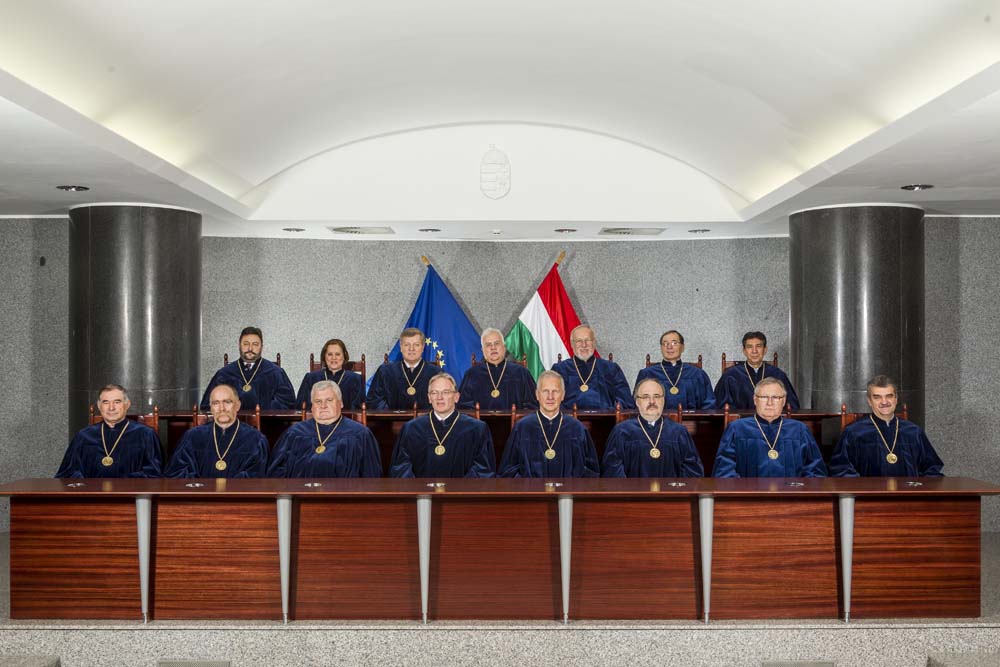The https://english.atlatszo.hu use cookies to track and profile customers such as action tags and pixel tracking on our website to assist our marketing. On our website we use technical, analytical, marketing and preference cookies. These are necessary for our site to work properly and to give us inforamation about how our site is used. See Cookies Policy
We are going to Strasbourg for nine years of inaction by the Constitutional Court of Hungary, ours is the longest-running case
On 3 June 2013, Barack Obama was the US President and David Cameron was the British Prime Minister. The children born then are now in third grade. One euro was 300 forints, Közgép was still building the M3 motorway and IMG was promoting the cuts in public utility bills for the Hungarian government. The football clubs of Felcsút and Mezőkövesd were in NBII, Kisvárda in NBIII. Of the fifteen members of the Constitutional Court at the time, only six are now in office. Átlátszó lodged a complaint with the Constitutional Court on the same day, but no decision has yet been taken. We got bored and appealed to the European Court of Human Rights for inaction.
In the summer, it will be ten years since we submitted a data request to the Hungarian Development Bank to obtain information on the loan agreement concluded with Budai Malomipari Kft. in 2000, which played an important role in the acquisition of Zsolt Nyerges’ first billion, as well as the most important data relating to the granting and repayment of the loan.

Zsolt Nyerges was one of the top oligarchs close to Viktor Orban’s government that time. He was a close associate of Lajos Simicska, the oligarch who later famously and very publicly severed his close ties with Prime Minister Viktor Orban. As a direct result, Simicska’s business interests are were cut from the state supply of funding, meaning Nyerges has also had to step back.
In 2012, the Hungarian Development Bank refused our freedom of information request in its entirety, citing bank secrecy, and then we lost the resulting FOI lawsuit in nine months. However, we thought that it was inconsistent with the availability of data on national assets for the courts to accept banking secrecy as a legitimate basis for a total refusal, since the fact that the Hungarian State had in this case taken the financing decision in question through its bank could not, in our view, be a constitutional basis for the background to the decision to remain forever unknowable. Therefore, on 3 June 2013, we filed a constitutional complaint against the judgment of the Metropolitan Court of Appeal at the Constitutional Court of Hungary.
So it’s safe to say that we filed this constitutional complaint quite a long time ago. However, the only thing that has happened so far is that, almost three years after it was lodged, on 8 March 2016, a five-member panel of the Constitutional Court decided that the complaint was admissible, i.e. that it was suitable for a decision by the Constitutional Court.
According to the Constitutional Court’s website, the case was subsequently discussed four more times by the full panel, the last of which was in April 2018. As no decision has yet been taken, this is now the longest-running Constitutional Court case since a while.
However, we would gladly give up this glory, and we also do not think it is normal that after a case has been decided in nine months, nine years are not enough for the Constitutional Court to decide on the complaint. That is why we have now appealed to the European Court of Human Rights (ECHR) because of the delay in the constitutional court procedure. Partly because the length of the delay is now well beyond the maximum time accepted by Strasbourg practice for any dispute.
And partly because the current practice of the ECHR requires prior recourse to a constitutional complaint for appeals against decisions of the Hungarian courts. Thus, the delay in constitutional complaints also blocks the possibility of recourse to the ECHR as long as the constitutional complaint is considered an effective remedy in Strasbourg.
Written by Balázs M. Tóth. Cover photo: The Constitutional Court in 2013 – from the Constitutional Court website.
Support independent investigative journalism in Hungary, become a patron of Atlatszo on Patreon!
Share:
Your support matters. Your donation helps us to uncover the truth.
- PayPal
- Bank transfer
- Patreon
- Benevity
Support our work with a PayPal donation to the Átlátszónet Foundation! Thank you.
Support our work by bank transfer to the account of the Átlátszónet Foundation. Please add in the comments: “Donation”
Beneficiary: Átlátszónet Alapítvány, bank name and address: Raiffeisen Bank, H-1054 Budapest, Akadémia utca 6.
EUR: IBAN HU36 1201 1265 0142 5189 0040 0002
USD: IBAN HU36 1201 1265 0142 5189 0050 0009
HUF: IBAN HU78 1201 1265 0142 5189 0030 0005
SWIFT: UBRTHUHB
Be a follower on Patreon
Support us on Benevity!

